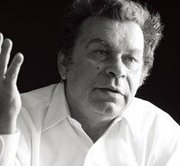2011 Eli Goldratt's 2 days Upgrade session
Info
Length:
Between 6 min and 1 hr segments.The complete 2 days upgrade is 6 hrs
Designed for:
Executives, Managers, Consultants and AcademicsLanguage:
EnglishFormat:
DVD and Online (TOC.tv)Share
Recommend
Dr. Eli Goldratt's last development was the process to ensure the permanent evolution of the Theory of Constraints (TOC)
. He claimed that in order to live a full and meaningful life we need to think clearly, and in order to think clearly there are four main obstacles that must be overcome. The work to overcome these 4 obstacles is now known in the TOC Community as the Pillars of TOC.
The TOC community has truly dismantled the first three obstacles. The first two days of the 2011 TOCICO International Conference were devoted to understanding Dr. Goldratt's perspective on the fourth obstacle - thinking that "we know" and finding ways to erode it and to build the solid grounds of the fourth Pillar - "Never say I know"
.
 How Dr. Eli Goldratt chose what to present on the first two days at the TOCICO Annual Conference
How Dr. Eli Goldratt chose what to present on the first two days at the TOCICO Annual ConferenceAn excerpt from a lecture that was given by Eli on May 5, 2011, at the Goldratt House.
"I asked myself a very simple, straightforward question: 'What would justify my presentation?' By this I mean to ask two things - the first is what is expected from me, by the TOC community, by those coming to the TOCICO; and the second is what I want to share with the TOC community to allow its continual growth. In other words, I was asking myself 'What is new TOC knowledge?'
"The answer, I discovered, is four-fold. The first criterion is that while the knowledge must be new, it must also be continuous. Obviously, the new knowledge cannot go against what has been said directly - it should not, if we have done due diligence on our analysis to date. The new knowledge has to relate to what has been said already, to the existing terminology and practices.
"And this leads me to the second criterion of my answer that the new knowledge has to enhance the existing knowledge. And by enhance I mean it has to blow the ship out of the water completely. If the power of the new knowledge is not at least double that of the existing knowledge, it does not enhance it sufficiently for me to call it 'new'.
"The third criterion is closely related to the former. While the second issue is the power of the upgrade, the third is that of its scope. Such new knowledge must upgrade all the material. It cannot be only a tweak to one S&T tree; it cannot be a refreshed look at a conflict cloud. It has to be something fundamental that will influence everything we do.
"Of course, and this is the last point, in order to be new, it should be based only on developments within the last relevant period. In this case, the relevant time is that which lapsed between the two TOC-ICO conferences: 12 months of development. And I believe that one year is a good amount of time to reflect on the advancement of knowledge.
"Of course, all that was left for me was to find such knowledge...luckily, I did."




